Film Rant: Carrie (1976)
Carrie gives new meaning to bucket o’ blood. Carrie (1976) directed by the amazing Brian DePalma (who also directed one of my favorite films, Body Double) is an interesting and very difficult little film – and one that will see a remake later in the spring of 2013, directed by Kimberly Peirce (Boys Don’t Cry) starring Chloe Moretz in the title role. Carrie is truly a young girl’s dream come true and brutal nightmare all at once.
Carrie starts out a bit like a women-in-prison film from the 1970s: cue the shower and Carrie (Sissy Spacek) soaping her wet and naked body, caressing her breasts with soap. However, Carrie has just gotten her period, and she’s not quite sure how to deal with it. Carrie is an outsider and she is child-like, skinny and frail. She starts begging the other girls in the locker room for help, but instead they throw tampons and pads at her screaming, “Plug it up, Plug it up!” Now, for my male readers out there – getting your period is upsetting for any young woman, but being attacked by mean girls in the locker room while you’re bleeding between your legs for the first time would be a complete and total nightmare. This would be a much worse experience for a girl than getting a boner during math class would be for a boy. Trust me.
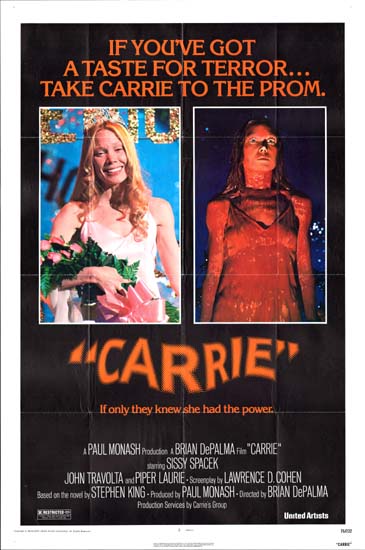 Carrie is so frightened by what is happening to her (her mother failed to tell her that eventually when you grow up, your body prepares you for children and when you don’t get pregnant, you bleed – a natural part of life – but terrifying for any girl who doesn’t have that one-on-one conversation with a mother or caretaker) that she blows a light bulb out with her mind and so begins the horror story of Carrie, a girl traumatized by her own femininity and femininity all around her; by her mother and by the girls at school as Carrie enters womanhood. It’s hard to say why Carrie turned out the way that she did: shy, reclusive and nervous. She possesses an inner anger and stress that many women eventually overcome after puberty and all of its natural difficulties. For starters, Carrie’s mother is bat shit crazy on the notion of religion and Christ our savior. Carrie is so sexually repressed, her womanhood buried so deep by her abusive mother that her sexual frustrations are expressed through her supernatural abilities.
Carrie is so frightened by what is happening to her (her mother failed to tell her that eventually when you grow up, your body prepares you for children and when you don’t get pregnant, you bleed – a natural part of life – but terrifying for any girl who doesn’t have that one-on-one conversation with a mother or caretaker) that she blows a light bulb out with her mind and so begins the horror story of Carrie, a girl traumatized by her own femininity and femininity all around her; by her mother and by the girls at school as Carrie enters womanhood. It’s hard to say why Carrie turned out the way that she did: shy, reclusive and nervous. She possesses an inner anger and stress that many women eventually overcome after puberty and all of its natural difficulties. For starters, Carrie’s mother is bat shit crazy on the notion of religion and Christ our savior. Carrie is so sexually repressed, her womanhood buried so deep by her abusive mother that her sexual frustrations are expressed through her supernatural abilities.
Inside the gymnasium, there is writing on the walls that reads, ‘White Eat Shit’ and a picture of Carrie. It’s almost hard for me to believe that people could be so cruel to a weak young girl. The gym teacher (also a woman) comes down hard on the girls who bullied Carrie in the locker room. She threatens them with their prom tickets – and not being able to go to prom is a teenaged girl’s nightmare (it wasn’t mine, but most girls I went to high school with really cared). Some of the female stereotypes in the film are a bit tedious such as the idea that women hate exercise (the gym teacher punishes the girls with after-school work-out sessions as detention) and that all girl’s worry themselves with are boys and dates.
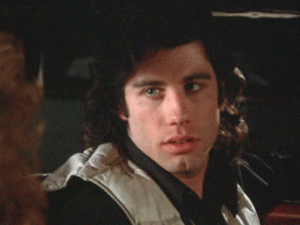 Oh, and John Travolta. Travolta plays the biggest asshole in the film, Billy. He smacks up his one-minute-hot-one-minute-cold girlfriend and he smashes several live pigs with a hammer to collect all of their blood for the prank. Billy is coerced into the plan after his girlfriend, Chris performs oral sex on him. I suppose a simple blow job can buy you a whole lot of torture-help.
Oh, and John Travolta. Travolta plays the biggest asshole in the film, Billy. He smacks up his one-minute-hot-one-minute-cold girlfriend and he smashes several live pigs with a hammer to collect all of their blood for the prank. Billy is coerced into the plan after his girlfriend, Chris performs oral sex on him. I suppose a simple blow job can buy you a whole lot of torture-help.
Start to finish, Carrie is horrific: from the way Carrie is treated and humiliated, to the demonstration of cruelty on behalf of the students at school, to the abuse that Carrie endures from her mother. Carrie runs deep even for those who finished highschool years ago and have nothing but bad memories to show for it.
Sissy Spacek is exceptionally powerful. I’ve loved Specek ever since Malick’s Badlands in 1973. She was born an actor. Spacek was rightfully nominated for Best Actress at the 1976 Oscars for her role as Carrie. My heart breaks for Carrie as she sits in the car, waiting for Tommy to open the door for her just before they enter the prom. Even when I saw this film for the first time, I knew Carrie was doomed because of the iconic image of her standing covered in blood, looking down in horror at her blood-stained arms and hands, the prom queen crown upon her head. My heart breaks a little further when Carrie speaks to her gym teacher about how happy she is; she will never forget this night.
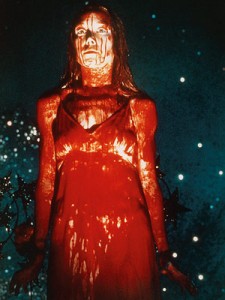 There are several parts of this movie that are extremely hard for me to watch – I don’t feel comfortable as a voyeuristic spectator, watching Carrie take such abuse and cruelty. Carrie is an absolute assault on the female spectator – especially since we as spectators know and can see the bucket of blood that is above Carrie’s head before it even drops. We are privy to that brutal and daunting information before Carrie even experiences it. It’s incredibly hard to watch. The use of sound in this final scene where the blood falls on Carrie is effective, as is the use of split screen. In fact, I hope the split screen is used in the remake – split screen was made for scenes like this. The red tint over some of the shots is a bit too stylized for my liking, but that’s DePalma for you. Carrie does manage to redeem or give voice to bullied young women everywhere at the very end by killing everyone in sight. Carrie kills those who harmed her – but she also kills those who genuinely tried to look out for her as well.
There are several parts of this movie that are extremely hard for me to watch – I don’t feel comfortable as a voyeuristic spectator, watching Carrie take such abuse and cruelty. Carrie is an absolute assault on the female spectator – especially since we as spectators know and can see the bucket of blood that is above Carrie’s head before it even drops. We are privy to that brutal and daunting information before Carrie even experiences it. It’s incredibly hard to watch. The use of sound in this final scene where the blood falls on Carrie is effective, as is the use of split screen. In fact, I hope the split screen is used in the remake – split screen was made for scenes like this. The red tint over some of the shots is a bit too stylized for my liking, but that’s DePalma for you. Carrie does manage to redeem or give voice to bullied young women everywhere at the very end by killing everyone in sight. Carrie kills those who harmed her – but she also kills those who genuinely tried to look out for her as well.
I’m careful to categorize Carrie as a horror film – for me, the horror in the film has more to do with the suffering Carrie endures than the blood and death at the end. Or, if the blood and death at the end of the film is the horror – then that makes Carrie a female monster, and that is a bit troubling for me. Carrie is a product of circumstance with nowhere else to turn, and no one else to turn to.
When Carrie finally makes it back to her house, still covered in blood, she realizes that her mother has turned the place into a cult-like crazy house with candles and pictures of the saints everywhere. Even odder is the fact that this is comforting to Carrie. She gets into the bath and washes the blood off. She looks so vulnerable and sad – Carrie wants nothing more than to just cry in her mother’s arms, she begs her mother to hold her. Her mother, Margaret White (Piper Laurie, also nominated for this role) tells Carrie about her past sins – her husband’s drinking, and the two times that they actually had sex. Margaret believes that Carrie is sent from the devil, so she stabs her with a knife in the back. Carrie has no choice but to fight back against her mother, using her mind to kill once more.
Even creepier, her mother dies in the shape of a cross – her two hands bound by a knife to each side of a doorframe. This imagery signifies that maybe Carrie is the devil? Or the anti-christ in some form? Carrie and her mother are buried together inside the house as it crashes and burns to the ground, and even after she is dead, Carrie continues to haunt the prom’s survivor from the grave in the form of nightmares. Ah – it’s all really so complicated, traumatic and troublesome!
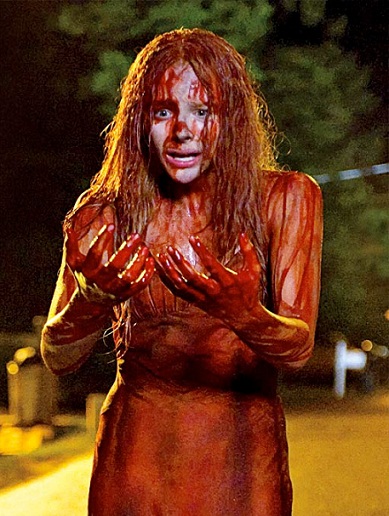 While some theorists such as Robin Wood and Gregory Waller have viewed the film as progressive or a thorough critique of American institutions and values, other theorists such as Vivian Sobchack paints Carrie as a victim of American culture. I sit on the fence when it comes to this film. I’m troubled with the fact that because of Brian DePalma’s authorial camera movement, references to Hitchcock, and the fact that Carrie ends as a woman’s worst nightmare which includes the final death and destruction of Carrie, Carrie can be considered the opposite of feminist. The film really does equate femininity with monstrosity – and not just any kind of monster, but the worst kind – the devil.
While some theorists such as Robin Wood and Gregory Waller have viewed the film as progressive or a thorough critique of American institutions and values, other theorists such as Vivian Sobchack paints Carrie as a victim of American culture. I sit on the fence when it comes to this film. I’m troubled with the fact that because of Brian DePalma’s authorial camera movement, references to Hitchcock, and the fact that Carrie ends as a woman’s worst nightmare which includes the final death and destruction of Carrie, Carrie can be considered the opposite of feminist. The film really does equate femininity with monstrosity – and not just any kind of monster, but the worst kind – the devil.
Writer of the book, Stephen King has stated instead that Carrie is feminist because Carrie learns how to channel her power, and she can only do this once she becomes a woman. True, and add the fact that although committing murder all over town in the end, Carrie is portrayed as a hero. Perhaps Carrie is the ultimate anti-hero. Then again, if a movie was made about the Columbine shootings and most of the film was dedicated to the bullying that the two young men went through prior to shooting up the school, would them taking their revenge on those that hurt them make them heroes as well? As disgusting a though as that is, it would all depend on the style of the film and the choices that the director would make stylistically and aesthetically. Hmmm…
Carrie is an open wound that needs surgery, or at least a few stitches. I personally can’t wait for the remake because I’m a huge Peirce fan, and I’m hopeful that Carrie will finally be given the strong voice that she so desperately needs.
Source: Lianne Spiderbaby

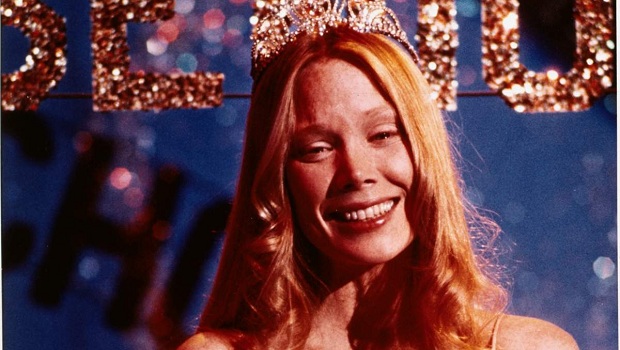
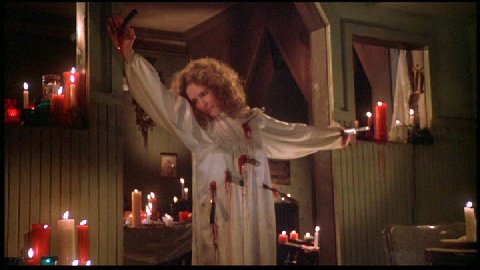

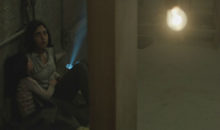




Having read the book multiple times, watched the movie twice (once before the book and then again to compare it to the book), I can tell you that you missed the mark on the basic truths of the story (book or movie)
It is a coming of age story in which a girl becomes a woman through many cruel trials and tribulations. The supernatural tragedy that occurs at the end was beyond Carrie’s control, a much fairer analogy would be that of handing the keys of a loaded school bus to a 15 year old who’s only driven once before. Your Columbine analogy is not even close.
The original story was written as documentary (to try to figure out what exactly happened in the gymnasium) It is through the “White Commission” that we find through survivor’s testimonies, through teachers and neighbours what might have happened.
Carrie was a social criticism of the religious importance that has been given to “virginity” and so yes, I would say that his original story was feminist. However Hollywood is famous for going for gore instead of social criticism, when it comes to movies based on books.
I hope that the remake will be more like the book, and that criticism is more obvious so that more people will understand Carrie, beyond gore and the literal bloodbath.